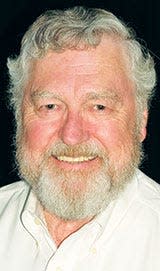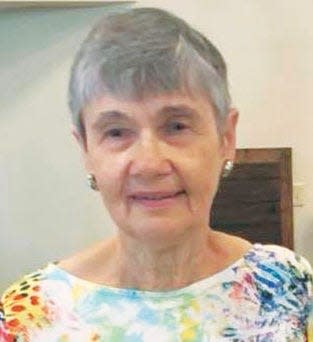Rev. Jones entertains, teaches about the Black influence on American music
- Oops!Something went wrong.Please try again later.
- Oops!Something went wrong.Please try again later.
- Oops!Something went wrong.Please try again later.
At his June 2 and 3 performances at the sixth annual Flatwater Tales Storytelling Festival in Oak Ridge’s Historic Grove Theater, the Rev. Robert B. Jones provided variety, playing several instruments, singing, and leading singalongs and telling stories. If you were there you realized Jones engaged the audience and the experience was amazing.

His versatility was nothing short of outstanding. Now enjoy looking back on those musical and story presentations as Carolyn Krause summarizes how he used his talents to not only entertain, but also educate his audiences about the impact of Black music on American music.
***
At the recent Flatwater Tales Storytelling Festival, the Rev. Robert B. Jones taught attendees a history of American music and entertained them with songs and stories, often while strumming a guitar. This multi-talented, multi-instrumentalist is a highly educated blues musician who has opened for B.B. King, Bonnie Raitt and Taj Mahal.
He treated the audience to stories, jokes and a partial history of how American Black music that had evolved from its African roots heavily influenced what we call American music. Sometimes he gave mocking musical impersonations of popular singers, including Elvis Presley, Johnny Cash and Michael Jackson.
Jones impressed the crowd by simultaneously playing the guitar and harmonica. He also played the fiddle, which he said was a popular instrument for the Scottish and Welsh immigrants to the United States.
Calling his grandmother in Detroit “a drug woman because she drugged me to church,” Jones said that she loved country blues, which is defined as music that “relies on the expressive power of the voice with sparse instrumental accompaniment, usually a guitar or harmonica.”
Jones said, “I started to see the similarities between church music and blues music, and I finally figured out that the blues came out of sacred music.”
He explained that enslaved Black people in the 19th century held their own church services, often in a barn.
“Amazing Grace sounded different in a barn in the 1850s than in Methodist churches today,” he said.
Playing the guitar and singing, he imitated the different styles of famous people who sang “Amazing Grace,” ranging from Aretha Franklin to President Obama.
Jones noted that enslaved Africans about to board a ship to America were not told “be sure you bring your instruments.” However, in the American South they discovered gourds like the ones in Africa they had used as drums.
"A drum can carry a message, but white people would hear that,” he said, explaining that an inventive enslaved person put three long strings and one short string on a gourd and fashioned it into a banjo.
Enslaved Blacks trying to escape plantations relied on coded messages, such as the song “Wade in the Water,” which the audience sang with Jones. The slaves had learned the Bible story about the children of Israel who crossed the Red Sea into the promised land to achieve their freedom. The slaves found out they could gain their freedom if they could cross the Ohio River, especially if abolitionists met them and took them to a safe place (they were called Moses by freed slaves). “Wade in the Water” is a song with a coded message, Jones said, because “if you waded in the water, the slaveowners’ dogs couldn’t pick up your scent and track you down.”
Switching to the 20th century, he talked about the Black musician, Thomas Dorsey.
"Dorsey came up with blues and jazz mixed with spirituals to make what he calls gospel music,” Jones said.
Dorsey came to be known as the father of gospel music in written form. In the late 1920s, he began composing religious tunes, selling sheet music of the nearly 1,000 gospel songs he authored to churches in Chicago and throughout the nation.
Jones led the audience in singing “Precious Lord, Take My Hand,” first recorded in 1937 and written after the death of Dorsey’s wife and baby. It sold millions of copies throughout the years and was recognized by Martin Luther King as his favorite gospel song.
“Dorsey was a great piano player, but not much of a singer,” Jones said. “But he found a Black woman in Louisiana by the name of Mahalia Jackson, and he got her to record his song.” Jones sang the song in the style of the famous American gospel singer, widely considered one of the most influential vocalists of the 20th century.
Jones played some of the music of Edward James “Son” House Jr., an American Delta blues singer and guitarist noted for his highly emotional style of singing and slide guitar playing.
He said that Jimmie Rodgers, a white man who had labored with Black railroad workers and then turned to music after he contracted tuberculosis, “recorded one of the first country music records, but they sounded like the blues.” He died at the age of 35 and was later called the father of country music. Jones showed how “blues and country music are cousins” as he impersonated Johnny Cash singing “Deep Blue Sea.”
In the 1940s, Jones said, the blind musician Ray Charles grew up playing gospel.
"But instead of saying ‘Jesus,’ Ray Charles said ‘Baby,’ and his songs became what is called rhythm and blues, or R&B,” he added. Jones remarked that R&B and other musical genres having guitar accompaniment used the “same five notes and the same three chords.”
The audience was reminded of the popular CBS show on Sunday night in the 1950s when Ed Sullivan introduced and turned into a superstar a skinny white Mississippi native who was influenced by the Black music he heard in his neighborhood. It was Elvis Presley, who became known as “the king of rock ‘n’ roll,” as well as a heartthrob for teens and a significant cultural figure in the 20th century.
Jones said that few young people that he has asked can name the “Black king of rock ‘n’ roll.” The Black King was Chuck Berry, an American singer, guitarist, and songwriter from St. Louis who pioneered rock ‘n’ roll. He was nicknamed the “Father of Rock ‘n’ Roll.”
Jones performed Michael Jackson’s “Beat It.” Then he led the audience in singing “Rollin’ on the River” and “We Shall Overcome,” the anthem famously adopted by the Civil Rights Movement in the 1960s. It was based on the 1901 gospel song “I’ll Overcome Some Day” by the Rev. Charles A. Tindley, son of an enslaved Black man.
The Friday night performance concluded with Jones’ rendition of the U.S. armed forces anthems and “Taps,” played on the guitar. Clearly, Jones is a patriotic American.
On Saturday night, Jones told the story of Blind Willie Johnson (1897-1945), a Black American gospel blues singer, guitarist and evangelist, who became famous for singing his original recorded song, “Dark Was the Night, Cold Was the Ground.” That song was one of 27 songs selected in 1977 by American astronomer Carl Sagan and his team for the Voyager Golden Record. It was intended to represent the human experience on Earth and communicate it to other life forms in the universe that the Voyager probe might reach.
"You can’t do too much better than hear the voice of Johnson as he streaks across the heavens,” Jones said.
“Blind Willie Johnson wasn’t born blind,” Jones noted. “He was blinded when a woman angry with his father sought vengeance because this man did not love her, but she loved him. So, she decided to throw lye water at this little boy’s eyes. He was blinded but it never killed his spirit.”
Jones also told how Johnson died after his house burned down in 1945. While living in the ruins of his home, he caught a cold that turned into pneumonia, and no hospital would admit him either because he was blind or because he was Black.
A Wikipedia article on Blind Willie Johnson gives a slightly different explanation for his blindness: “Willie’s father had violently confronted Willie’s stepmother about her infidelity, and during the argument she splashed Willie with a caustic solution of lye water, permanently blinding him.” The article also states that after his house burned down, he contracted malarial fever, which probably eventually killed him although his death certificate listed syphilis as a cause.
As Jones said in a quote repeated by storyteller Bil Lepp, “It didn’t matter whether this story happened; it was the truth!”
***
Thank you, Carolyn, for attending the Flatwater Storytelling Festival and for capturing the amazing versatility of the Rev. Robert Jones. I was delighted to meet him and to exchange a few words about the history of Oak Ridge. His questions demonstrated he was genuinely interested in our history and he expressed a strong desire to view the documentary films available at: https://www.y12.doe.gov/about/history/video-gallery.


This article originally appeared on Oakridger: Jones entertains, teaches on the Black influence on American music

